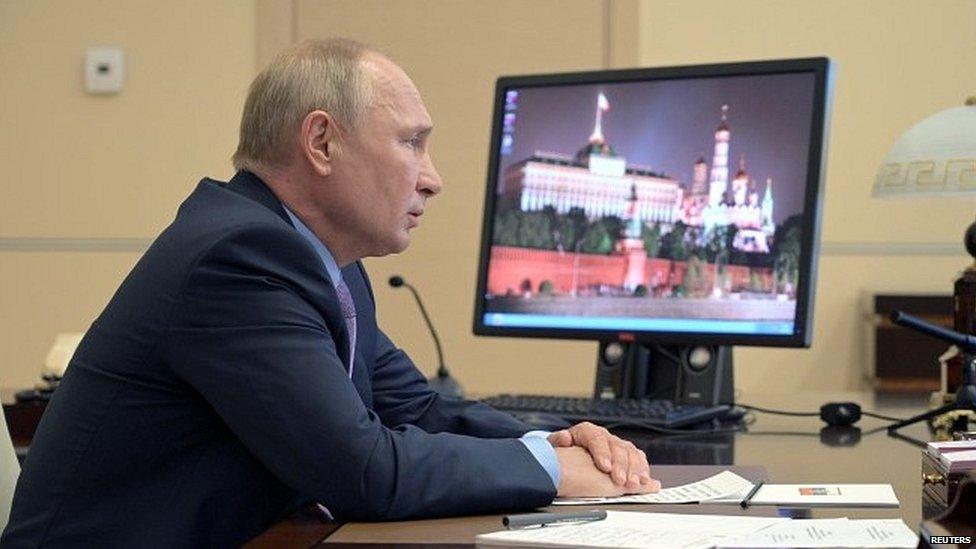Russia report: UK considers tougher security laws after criticism by MPs
- Published
Keir Starmer questions Boris Johnson on the Russia report in parliament
Ministers are considering strengthening security laws after a report, external by MPs accused them of underestimating the threat of Russian interference.
Home Office Minister James Brokenshire said foreign agents could be required to register in the UK in future.
He told MPs that this and other "new offences and powers" for dealing with foreign spies were being looked at.
Labour's Sir Keir Starmer accused the government of complacency and leaving a "serious gap in our defences".
Speaking at Prime Minister's Questions, Sir Keir said the government had "delayed" legislation to help counter Russian interference, despite acknowledging 18 months ago that existing powers were insufficient.
"The PM sat on this report for 10 months and failed to plug a gap in our law in national security," he said.
"How is the PM going to address that gap and meet the threat with the joined-up, robust response it deserves?"
Boris Johnson said there was no other country in the Western world that was more "vigilant" about Russian interference, pointing to recent sanctions against Russian officials involved in human rights abuses and proposed laws to protect critical infrastructure and intellectual property.
"Let us be in no doubt about what this is all about," he said.
"It is about pressure from the Islingtonian remainers who have seized on this report to try and give the impression that Russian interference was somehow responsible for Brexit.
"The people of this country did not vote to leave the EU because of pressure from Russia."
The Intelligence and Security Committee report claimed the government made no effort to investigate claims of Russian interference in the EU referendum and criticised intelligence agencies for not prioritising the issue.
The government has said an inquiry is not necessary as it has "seen no evidence of successful interference".
'Additional powers'
But ministers are listening to calls from all parties to do more to counter Russian espionage and subversion after the UK was described the main target after the US and Nato.
Plans to make foreign agents register were mentioned in the government's legislative agenda, external last December, and were previously announced by former home secretary Sajid Javid in May last year.
In response to an urgent question from Labour in the House of Commons, Mr Brokenshire said the UK would consider strengthening the Official Secrets Act and tightening rules on investment visas.
"Let there be no doubt, we are unafraid to act where necessary to protect the UK and our allies."


If you do not seek, you do not find.
Whether deliberate or deficient, the Intelligence and Security Committee's very long-awaited report outlines gaping holes in the UK's handling of the threat from Russia.
For years, it seems a lack of priority, and a lack of curiosity, allowed the risks to go unmonitored, if not to go unchecked.
The UK government has now stiffened its attitude to Putin's Russia.

But shadow home secretary Nick Thomas-Symonds said the "conscious" decision not to consider whether they was any attempt to manipulate the Brexit vote spoke volumes.
Urging ministers to treat the issue with the "seriousness it deserves", he added: "I thank the security services for the work they do but they need help. This report makes clear they have not received the strategic support, legislative tools or resources necessary to defend our interests."
In its 50-page report, the ISC said the UK was "clearly a target" for disinformation campaigns around its elections, but that the issue was described as a "hot potato", with no one organisation taking a lead to tackle it.

Russia has dismissed the report as Russophobia
The committee suggested a new Espionage Act could help prevent individuals acting on behalf of a foreign power from concealing their links with that country.
It said an obligation similar to that in the US - where agents are required to register with the Justice department - would "clearly be valuable in countering Russian influence in the UK".
ISC member Kevan Jones said he was concerned that the Law Commission, which was asked last year to look at the legal issues regarding such a move, had yet to release its findings.
"Can I urge the minister to make sure we actually gets this legislation in place because it is needed," he said. "Let's hope it is not just some spin to get the headlines."
Downing Street was accused of holding back the ISC report ahead of December's UK election and for delaying its nominations to set up the new committee - both claims it has denied.
Its chair Julian Lewis, who was stripped of the Conservative whip after defying No 10 by standing for its leadership, sought reassurances that Downing Street special advisers would not be able to interfere with its work

PANORAMA: Lifting the lockdown in Salford
I MAY DESTROY YOU: The groundbreaking drama making headlines in lockdown
